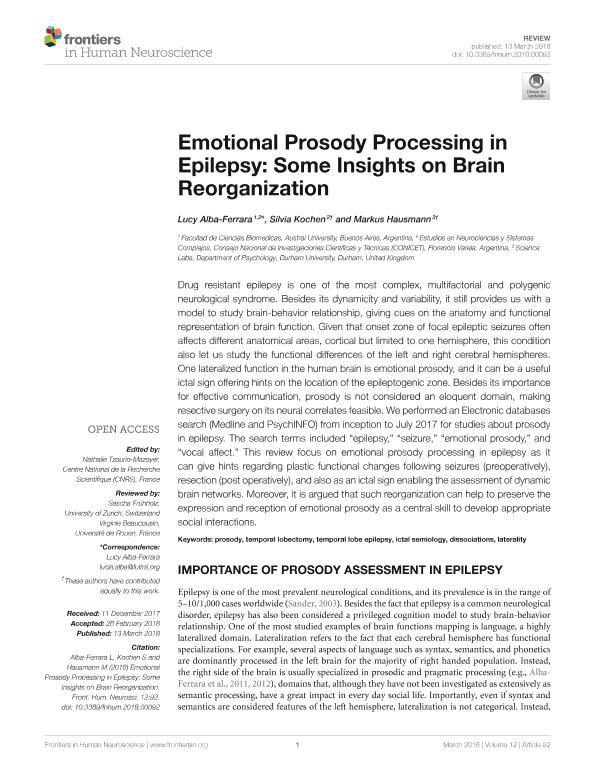Mostrar el registro sencillo del ítem
dc.contributor.author
Alba-Ferrara, Lucy
dc.contributor.author
Kochen, Sara Silvia

dc.contributor.author
Hausmann, Markus
dc.date.available
2020-01-31T14:42:52Z
dc.date.issued
2018-03
dc.identifier.citation
Alba-Ferrara, Lucy; Kochen, Sara Silvia; Hausmann, Markus; Emotional prosody processing in epilepsy: Some insights on brain reorganization; Frontiers Research Foundation; Frontiers In Human Neuroscience; 12; 92; 3-2018; 1-11
dc.identifier.issn
1662-5161
dc.identifier.uri
http://hdl.handle.net/11336/96365
dc.description.abstract
Drug resistant epilepsy is one of the most complex, multifactorial and polygenic neurological syndrome. Besides its dynamicity and variability, it still provides us with a model to study brain-behavior relationship, giving cues on the anatomy and functional representation of brain function. Given that onset zone of focal epileptic seizures often affects different anatomical areas, cortical but limited to one hemisphere, this condition also let us study the functional differences of the left and right cerebral hemispheres. One lateralized function in the human brain is emotional prosody, and it can be a useful ictal sign offering hints on the location of the epileptogenic zone. Besides its importance for effective communication, prosody is not considered an eloquent domain, making resective surgery on its neural correlates feasible.We performed an Electronic databases search (Medline and PsychINFO) from inception to July 2017 for studies about prosody in epilepsy. The search terms included “epilepsy,” “seizure,” “emotional prosody,” and “vocal affect.” This review focus on emotional prosody processing in epilepsy as it can give hints regarding plastic functional changes following seizures (preoperatively), resection (post operatively), and also as an ictal sign enabling the assessment of dynamic brain networks. Moreover, it is argued that such reorganization can help to preserve the expression and reception of emotional prosody as a central skill to develop appropriate social interactions.
dc.format
application/pdf
dc.language.iso
eng
dc.publisher
Frontiers Research Foundation

dc.rights
info:eu-repo/semantics/openAccess
dc.rights.uri
https://creativecommons.org/licenses/by-nc-sa/2.5/ar/
dc.subject
DISSOCIATIONS
dc.subject
ICTAL SEMIOLOGY
dc.subject
LATERALITY
dc.subject
PROSODY
dc.subject
TEMPORAL LOBE EPILEPSY
dc.subject
TEMPORAL LOBECTOMY
dc.subject.classification
Neurología Clínica

dc.subject.classification
Medicina Clínica

dc.subject.classification
CIENCIAS MÉDICAS Y DE LA SALUD

dc.title
Emotional prosody processing in epilepsy: Some insights on brain reorganization
dc.type
info:eu-repo/semantics/article
dc.type
info:ar-repo/semantics/artículo
dc.type
info:eu-repo/semantics/publishedVersion
dc.date.updated
2019-10-16T18:27:32Z
dc.journal.volume
12
dc.journal.number
92
dc.journal.pagination
1-11
dc.journal.pais
Suiza

dc.description.fil
Fil: Alba-Ferrara, Lucy. Provincia de Buenos Aires. Ministerio de Salud. Hospital Alta Complejidad en Red El Cruce Dr. Néstor Carlos Kirchner Samic; Argentina
dc.description.fil
Fil: Kochen, Sara Silvia. Provincia de Buenos Aires. Ministerio de Salud. Hospital Alta Complejidad en Red El Cruce Dr. Néstor Carlos Kirchner Samic; Argentina
dc.description.fil
Fil: Hausmann, Markus. Neurosciences Center; Reino Unido
dc.journal.title
Frontiers In Human Neuroscience

dc.relation.alternativeid
info:eu-repo/semantics/altIdentifier/url/http://journal.frontiersin.org/article/10.3389/fnhum.2018.00092/full
dc.relation.alternativeid
info:eu-repo/semantics/altIdentifier/doi/http://dx.doi.org/10.3389/fnhum.2018.00092
Archivos asociados
